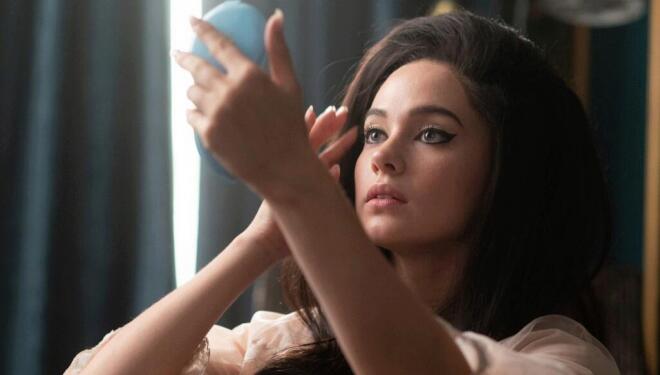
There's a certain fear and hesitancy when considering the story of Elvis and Priscilla Presley. Because they met when she was 14 and he was 24, the debate of historical contexts versus modern sensibilities always disrupts the nuances of what really happened. It's a tricky tale to tell in a post-#MeToo landscape. That's why Sofia Coppola's ambitious biopic Priscilla feels daring.
Coppola is too intelligent a filmmaker to opt for black-and-white portrayals that make abused women into helpless damsels and abusive men into ogres of toxicity. Instead, she observes from Priscilla's mindset – how she felt, how she saw things – shaving away the retrospective right and wrong. Dangling in this difficult territory, in which the King of rock 'n' roll has big groomer energy, the film provides a delicate, honest and empowering portrait of Priscilla’s journey from naïve girl to independent woman.

Cailee Spaeny as 14-year-old Priscilla. Photo: A24
Starting in 1959, Cailee
Spaeny looks unambiguously young as 14-year-old Priscilla. She sits in an American diner on a US Air Force base in West Germany, attracting a
soldier friend of the enlisted Elvis Presley. They invite this small, timid
schoolgirl to one of Elvis's parties. After
some polite and persuasive efforts with her understandably sceptical parents, Priscilla is allowed to attend the party. She meets an
awkward Elvis who shyly chuckles when she admits she’s in the ninth grade (‘You
just a baby’).
Euphoria actor Jacob Elordi portrays the musician with less energy than his famous persona. Does Elvis switch personalities for Priscilla or is he more genuine around her? Hard to tell. It's equally difficult to ascertain if he's conscious of his subsequent gross and predatory behaviour or simply following the conservative expectations of the time. But he’s not painted as a demonic paedophile. There are dates, kisses in cars, and cuddles in bed. Emphatically, there's no sex. It’s a complicated depiction, one that Elordi handles well.
Coppola works with less than a quarter of Baz Luhrmann's budget for his tortuous Elvis movie, but that suits the tone of her script. Compared to Elvis’s life of drugs and booze (some of which bleeds across), Priscilla leads a largely sedentary life filled with laborious routines.
She spends years waiting for Elvis’s call after he leaves the base, enduring the everyday effort of school. Her only solace is in thinking about him. When she moves to Graceland at age 17, those routines continue as Elvis records music and shoots movies – to which Priscilla is never invited. She’s comfortably imprisoned inside the Memphis mansion.

Jacob Elordi and Cailey Spaeny as Elvis and Priscilla Presley. Photo: A24
The
film proceeds at a muted pace, Philippe Le Sourd’s visuals often blighted of
colour – the rooms plunged in dusty shadows. She lingers in a thick loneliness,
but doesn’t cause a fuss… until it’s intolerable. Her grandiose fantasies of Elvis peel away. It’s telling that much of his music isn’t featured in the film, emphasising
that she sees him less as an icon and more as a man. And this man is overloaded with
an incomparable ego that turns into emotional and physical hurt.
So much of her life is wrapped around him; any attempt to form her own identity is shot down, whether it’s in considering a job or buying new clothes. Some of the few aspects under her control are make-up and nail varnish, which Coppola glorifies in gripping close-ups.
At 110 minutes, Priscilla feels slightly too long. However, the repetitive sections speak to Priscilla’s psychology – divided between caring for her privileged life with Elvis and feeling stuck in an affluent purgatory. Spaeny's soft, resilient performance carries such vivid love and frustration that it's impossible to look away. Coppola's crafted a quiet, fascinating piece of biographical filmmaking.
Reviewed at the London Film Festival 2023. Priscilla is out now in UK cinemas.
| What | Priscilla review |
| Price | £determined by cinemas |
| Website | Click here for more information |






